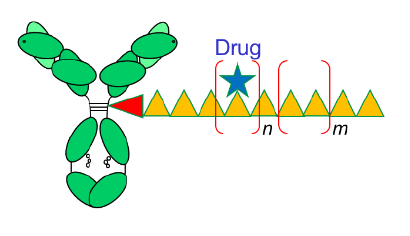The challenge
Some cancers are hard to reach
Solid tumours are a common type of cancer caused by an overrepresentation of specific proteins in a part of the body.
These are the sorts of cancers that can be cut out, but this becomes difficult when the cancers grow in the hard to reach places, such as between the brain and the spine. The median survival for patients with solid tumours is only 14 months if they go untreated.
Polymers are a great way to get drugs, peptides and antibodies to bond together to create cancer fighting drugs. However, you need the right polymer to get the job done, and most natural polymers are sequenced randomly.
Our response
Polymers for cancer treatment
The proteins that solid tumours overexpress are unique. We aim to capture that uniqueness and create a treatment that attacks the tumour directly by targeting those proteins with antibodies.

We developed Reversible Addition-Fragmentation chain Transfer (RAFT), a means of sequencing polymers that can lay them out in any direction and in any order. We can set up an order we want polymers to organise themselves into and RAFT will make it happen.
This makes it possible to sequence treatment that will target a solid tumour right at its base.
RAFT has allowed us to create polymers with the right structure for the components of anticancer drugs to combine. The antibody fragments, and drugs, come together on the polymers, share their cancer fighting potency to help us to create a more effective and targeted treatment.
The results
Joining up with RAFT for better drug delivery
We can now make cancer treatment with the targeting of antibodies and the effectiveness of drugs that kill fast-growing cells. The antibody information targets the protein overexpressed on the cancer cell, both the antibody and the anti-cancer drug act to reduce the tumour and the polymer keeps the treatment in the blood for longer.
We design and create polymers using RAFT to create effective cancer treatments that require fewer injections over time. We hope to produce this medication on an even larger scale and use the same approach with other cancer targeting antibodies.
RAFT has so many applications outside of cancer treatment – we're always looking for more ways we can improve the world with polymers. We're also looking for more opportunities to expand the reach of RAFT and collaborate with industry to take advantage of this polymerisation technology.
